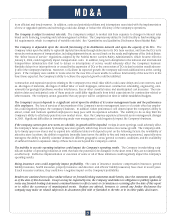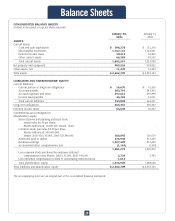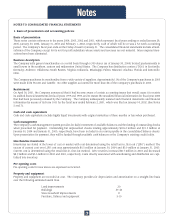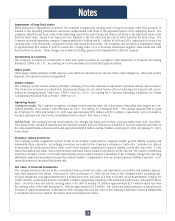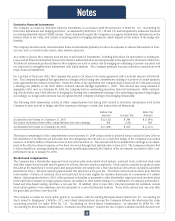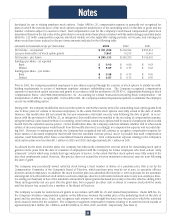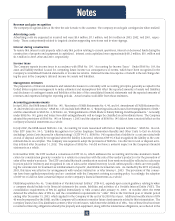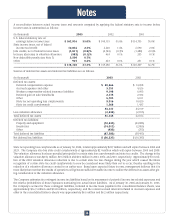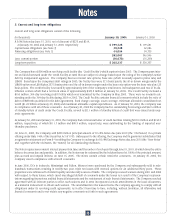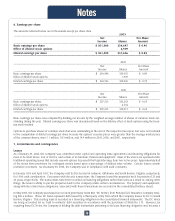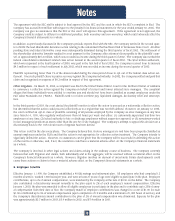Dollar General 2003 Annual Report Download - page 33
Download and view the complete annual report
Please find page 33 of the 2003 Dollar General annual report below. You can navigate through the pages in the report by either clicking on the pages listed below, or by using the keyword search tool below to find specific information within the annual report.
developed for use in valuing employee stock options. Under APB No. 25, compensation expense is generally not recognized for
plans in which the exercise price of the stock options equals the market price of the underlying stock on the date of grant and the
number of shares subject to exercise is fixed. Had compensation cost for the Company’s stock-based compensation plans been
determined based on the fair value at the grant date for awards under these plans consistent with the methodology prescribed under
SFAS No. 123 (with compensation expense amortized ratably over the applicable vesting periods), net income and earnings per
share would have been reduced to the pro forma amounts indicated in the following table.
(Amounts in thousands except per share data) 2003 2002 2001
–––––––––––––––––––––––––––––––––––––––––––––––––––––––––––––––––––––––––––––––––––––––––––––––––––––––––––––––––––––––––––––––––––––––––––––––––––––––––––––––––––––––-
Net income – as reported $ 301,000 $ 264,946 $ 207,513
Less pro forma effect of stock option grants 7,867 15,217 11,461
–––––––––––––––––––––––––––––––––––––––––––––––––––––––––––––––––––––––––––––––––––––––––––––––––––––––––––––––––––––––––––––––––––––––––––––––––––––––––––––––––––––––-
Net income – pro forma $ 293,133 $ 249,729 $ 196,052
–––––––––––––––––––––––––––––––––––––––––––––––––––––––––––––––––––––––––––––––––––––––––––––––––––––––––––––––––––––––––––––––––––––––––––––––––––––––––––––––––––––––-
Earnings per share – as reported
Basic $ 0.90 $ 0.80 $ 0.63
Diluted $ 0.89 $ 0.79 $ 0.62
Earnings per share – pro forma
Basic $ 0.88 $ 0.75 $ 0.59
Diluted $ 0.87 $ 0.75 $ 0.59
–––––––––––––––––––––––––––––––––––––––––––––––––––––––––––––––––––––––––––––––––––––––––––––––––––––––––––––––––––––––––––––––––––––––––––––––––––––––––––––––––––––––-
Prior to 2002, the Company permitted employees to use shares acquired through the exercise of stock options to satisfy tax-with-
holding requirements in excess of minimum employer statutory withholding rates. The Company recognized compensation
expense for such stock option exercises and grants in accordance with the provisions of EITF 87-6, "Adjustments Relating to Stock
Compensation Plans," and FASB Interpretation No. 44, "Accounting for Certain Transactions Involving Stock Compensation – An
Interpretation of APB 25," as applicable. In December 2001, the Company modified its personnel policies to eliminate the employee
excess tax-withholding option.
During 2001, the Company modified its stock incentive plans to extend the exercise period for outstanding stock option grants from
one to three years for estates of deceased employees, to the extent that the stock options were fully vested at the date of death.
However, this modification did not extend the ten-year maximum contractual exercise term following the date of grant. In accor-
dance with the provisions of APB No. 25, as interpreted, this modification has resulted in the recording of compensation expense,
using the intrinsic-value based method of accounting, only for those vested stock options held by estates of employees which would
benefit from the extended exercise period. On the modification date, the Company could not estimate whether and to what extent
estates of deceased employees would benefit from this modification and, accordingly, no compensation expense was recorded dur-
ing 2001. However, in subsequent periods, the Company has recognized and will continue to recognize compensation expense for
those estates of deceased employees that benefit from the extended exercise period, and it is possible that such compensation
expense could materially affect future consolidated financial statements. Total compensation expense relating to the Company’s
stock option plans was less than $0.1 million in 2003 and 2002 and approximately $0.1 million in 2001.
As allowed by the stock incentive plans, the Company has historically extended the exercise period for outstanding stock option
grants to three years from the date of cessation of employment with the Company for former employees who meet certain "early
retirement" criteria which may include their age and years of service, to the extent that their stock options were fully vested at the
date their employment ended. However, this practice does not extend the ten-year maximum contractual exercise term following
the date of grant.
The Company may periodically award restricted stock having a fixed number of shares at a purchase price that is set by the
Compensation Committee of the Company’s Board of Directors, which purchase price may be set at zero, to executive officers,
directors and key employees. In addition, the stock incentive plan was amended effective June 2, 2003 to provide for the automatic
annual grant of 4,600 restricted stock units to each non-employee director (6,000 restricted stock units to any non-employee direc-
tor serving as Chairman) in lieu of the automatic annual stock option grants discussed previously, to become effective during 2004.
These units generally vest one year after the grant date, but no payout (in either cash or shares of common stock) shall be made
until the director has ceased to be a member of the Board of Directors.
The Company accounts for restricted stock grants in accordance with APB No. 25 and related interpretations. Under APB No. 25,
the Company calculates compensation expense as the difference between the market price of the underlying stock on the date of
grant and the purchase price, if any, and recognizes such amount on a straight-line basis over the period in which the restricted
stock award is earned by the recipient. The Company recognized compensation expense relating to its restricted stock awards of
approximately $0.4 million, $0.1 million, and $0.4 million, in 2003, 2002, and 2001, respectively. (See Note 9).
Notes
31


